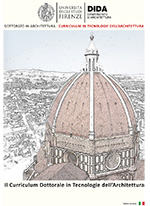Architectural Technologies
|
SCIENTIFIC PROJECT The scientific scenario for the programme in Architectural Tecnologies is research applied to the processes of transformation of habitats. At various scales, from construction materials to settlements and landscape, the research methodologies and tools proposed are aimed at offering contributions to scientific and technological innovation and development in architecture, in full respect of human needs, as well as of the cultural values of the communities in the places where interventions take place and the safeguarding of environmental resources. Within an integrated view of the building process, the various forms of innovation represent both the general sphere for cultural reflection, and the objectives of the PhD research. Research focuses on settlement questions, on topics of urban and building re-qualification in different contexts, efficiency and sustainability of material transformation processes, and on techniques for environmental enhancement and control. The programme in Architectural Technologies is organised into four fields of study:
In view of the increasing complexity of the processes of creation of architectural works and of the interaction between the various stakeholders involved, the programme in Architectural Technologies determines, in accordance with public and private entities, specific educational and training pathways aimed at satisfying clearly identified needs.
TRAINING PROGRAMME The Training Programme in Architectural Tecnologies follows three main strategic guidelines:
Throughout the years, side by side with traditional education of a technical-objective nature, new educational projects of a subjective and inter-subjective nature have been developed, which aim to ascribe value to previous experiences and to motivational factors, as well as to promote group identity. The desire to develop better educational methods, which are less rigid and closer to the needs of PhD research, is expressed through the activation, together with the educational activities included in the syllabus, of advanced teaching and training methods chosen by the PhD Candidates themselves, including the possibility to choose the research centres, both in Italy and abroad, where they will carry out study and training periods, and to devise and organise thematic seminars based upon their own specific interests. The drive towards inter-disciplinary learning is a defining element of the syllabus of the curriculum in Architectural Tecnologies; it reflects on the composition itself of the syllabus and in the promotion of certain specific educational projects. Such projects are aimed to the dialogue between knowledges and to consolidate in the PhD candidates speculative and critical capacities, as well as a healthy attitude towards the confrontation of ideas. Over the past few years an effort has been made to set the degree course in Architectural Tecnologies in a network of international relations, with the purpose of offering PhD Candidates new quality opportunities for learning and exchanging knowledge and ideas. International Cooperation for Development represents a particularly interesting field for research. International relations are strengthened and enriched by solid territorial roots: Florence and Tuscany, with their civil traditions and unparalleled cultural and landscape heritage are in fact at the basis of the cultural and geographic framework of many PhD research projects. For further information please visit: - http://www.dida.unifi.it/upload/sub/pdf/dottorato/programmaformatico2015.pdf |
Contact
Prof. Antonio Laurìa
browse the online Teaching Staff
Academic disciplines represented:
PhD Candidates Cycle XXVIII Filippo Bosi Chiara Casazza Alessandra Donato Paolina Ferrulli Ilaria Montella Cycle XXIX Elisabetta Fossi Angela Masciullo Leone Pierangioli Ilenia Maria Romano Cycle XXX
Cycle XXXI Mirko Romoli Arman Gholamzaeesaberi |
Last update
18.05.2021

